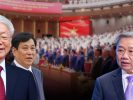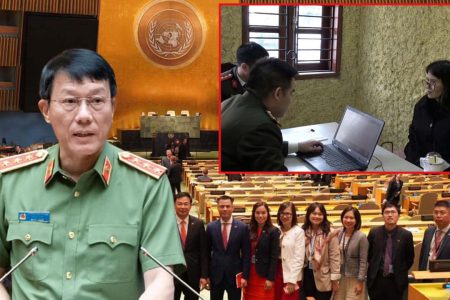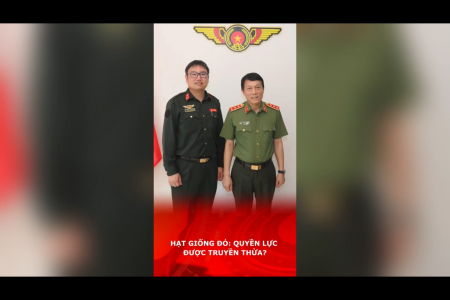The story of a suitcase containing dollars brought to the Central Commission for Inspection of the Communist Party of Vietnam, told by Mr. Nguyen Phu Trong on February 1, 2021 reminds former Prime Minister Nguyen Tan Dung’s words on November 14, 2012:
So we can understand that there have been bribery for positions, even very high-ranking posts of the regime apparatus.
A few people have forgotten the image of two suitcases and backpacks containing $3 million from bribes hidden on the balcony in 2015 of Minister of Information and Communications Nguyen Bac Son.
Those are just a few examples.
The number of people arrested increased and the positions of the corrupt persons higher, the greater the amount.
Where does corruption come from?

Right! Only officials in the state apparatus have the chance to become corrupted. The higher the position, the easier it is to become corrupted. Everyone loves money and property.
If they do not directly get corrupt, they can also support and protect their relatives from corruption and thereby benefit them.
Former communist leader Le Kha Phieu also admitted in 2005 that “it has become naturally to give and accept bribes at high levels.“
The higher the official, the better the ability to protect himself from being discovered and punished.
„Corruption in any country is there, only more or less, big or small,“ Mr. Trong said.
Standing like that, Mr. Trong did not specify where Vietnam’s corruption is, and why it is so difficult to fight against corruption in Vietnam.
Statistics of Transparency International (Transparency International) published in early 2020: Vietnam ranked 96/180 in corruption.
„Corruption is found everywhere to be touched,“ once a member of the National Assembly said.
General Secretary Nguyen Phu Trong says corruption „is the disease of the people having power“
Harms of corruption
According to Transparency International, corruption is a global problem. Damage caused by corruption accounts for 1 to 4% of the world’s total economic output each year, the biggest obstacle to the fight against poverty.
More frightfully, corruption „hinders a country’s political, economic and social development.“
According to the above organization, corruption is also the main cause of human rights violations in many countries.
However, corrupt officials and interest groups use the state’s available power to quell the press, suppress those who dare to denounce, and imprison their opponents.
But around the world there are many examples of corruption cases that violators are punished regardless of their positions, even heads of state.
The trial of former German president and 720 euros
For example, the 10th President of Germany, Christian Wullf.
Bild newspaper in those days was selling very well, German public opinion raged, German President was forced to resign in 2012, and taken to court later.
One of the indictments said Mr. Wullf and his family benefited 720 euros in hotel fees from friendly relations.
President Christian Wullf of Germany resigned in 2012 and had to appear in court after it was reported that he accepted a hotel stay without paying 720 euros from his time as governor.
President Christian Wullf phoned the editor-in-chief of Bild newspaper, wanting to influence and prevent Bild from criticizing him.
The editor-in-chief of Bild – Kai Diekmann immediately released the tape recording of the President’s words.
Compared with millions of dollars in a suitcase in Vietnam, the corruption amount of former German president, former vice president of the ruling party of the CDU, is very small. However, he was still sentenced.
Germany’s independent court has no reason to fear Mr. Wullf but conducted a fair trial. Editor-in-chief of Bild newspaper is still alive. Wullf’s CDU close ally, incumbent Chancellor Merkel, cannot help him.
In Germany or democratic countries, the free press, independent of the government, is the most effective anti-corruption factor.
The press is always thirsty for news, ready to roll into corruption detection to get good news, with many viewers, readers, and newspapers are sold well.
It is different with Vietnam’s state-owned media. It will immediately remains silent if it is instructed by the Minister of Information and Communication, the Prime Minister or even the General Secretary to stop.
Vietnam’s state-controlled media is financed by the government, it is managed and instructed specifically what to do.
How can it be against corruption if the detection and punishment of corruption is given to the most corrupted officials and their people?
People in Germany and Europe will probably laugh out loud if they hear that government officials „call on the entire population to fight corruption.“
Mr. Nguyen Phu Trong confessed his role that „Individuals play an important role, but only individuals.“ Then even more ominous. He is old and weak, he will stop working one day. So who will be able and capable to continue his anti-corruption activities?
„Error at mechanism“
Many officials and business people in Vietnam have honestly shared: if the management society is loose, they will have the opportunity to do business. „Just as closely as in Germany and the Western countries, we cannot have profit.“
In the past, when state officials met, they often asked „how are you?“ Now the catchphrase is „how are you doing these days?“
People with a passion for the country often sigh, ending with a familiar „fault at that mechanism“ when their debates near the end and they begin to feel afraid of telling the truth.
The right way is to apply the mechanism of power division, control of power, thoroughly implementing the rule of law … as well as being said in many documents of the Party and State, is it just to avoid saying about “three separate branches of power.”
In order for Vietnam to fight corruption effectively, the press must be independent, the courts and procuracies must be also independent, and the opposition parties automatically control each other.
Then why not apply?
Vietnam has only one leading party, that party captures the power of all other state organs, above all, including the law and the party leaders are the people who belong to the groups with the highest possibility of corruption.
Change will lead to their loss of exclusive power with many privileges and benefits. Does anyone want to change themselves to lose their existing advantages?
Germany will have the same problem as Vietnam if there is only one CDU party led by Angela Merkel exclusively. Bild newspaper would have not dared to cough and Mr. Christian Wullf would have had rescued by Mrs. Merkel within a note.
Abolishing the one-party-led mechanism, replacing it with a multi-party political system, which Germany or many developed countries, tops the list of the least corrupt countries that have successfully applied it.
But that sounds difficult for the leader of the Communist Party of Vietnam.
Vietnam’s propaganda apparatus will probably still argue that it is determined to maintain the one-party-led regime to „maintain stability“ the country.
Is it true that once corruption is inevitable and irreversible in that one-party system, it will lead to even more terrible consequences.
Mr. Trong once said: „Corruption is an internal invasion that threatens the survival of the regime.“
Thought not only threatens the survival of the regime but threatens the survival of the nation and the people. The systemic corruption can lead to the sale of country’s land and sovereignty to foreign nations.
In the face of huge benefits, those who use corruption as a cause of life will be very desperate, from nothing.
Civilized countries, highly developed, they are always ready to improve their management of their country to suit the trend of the times in order to develop more.
Opening up to do business to the world, Vietnam cannot forever like the current model of country management, it will always conflict with international commitments.
Avoiding change will only prolong stagnation, worsen corruption, slow the country’s development rate and even lead to breakdown.
An effective anti-corruption solution is there, Vietnam only needs to make choices to apply it.
Thoibao.de (Translated)


























